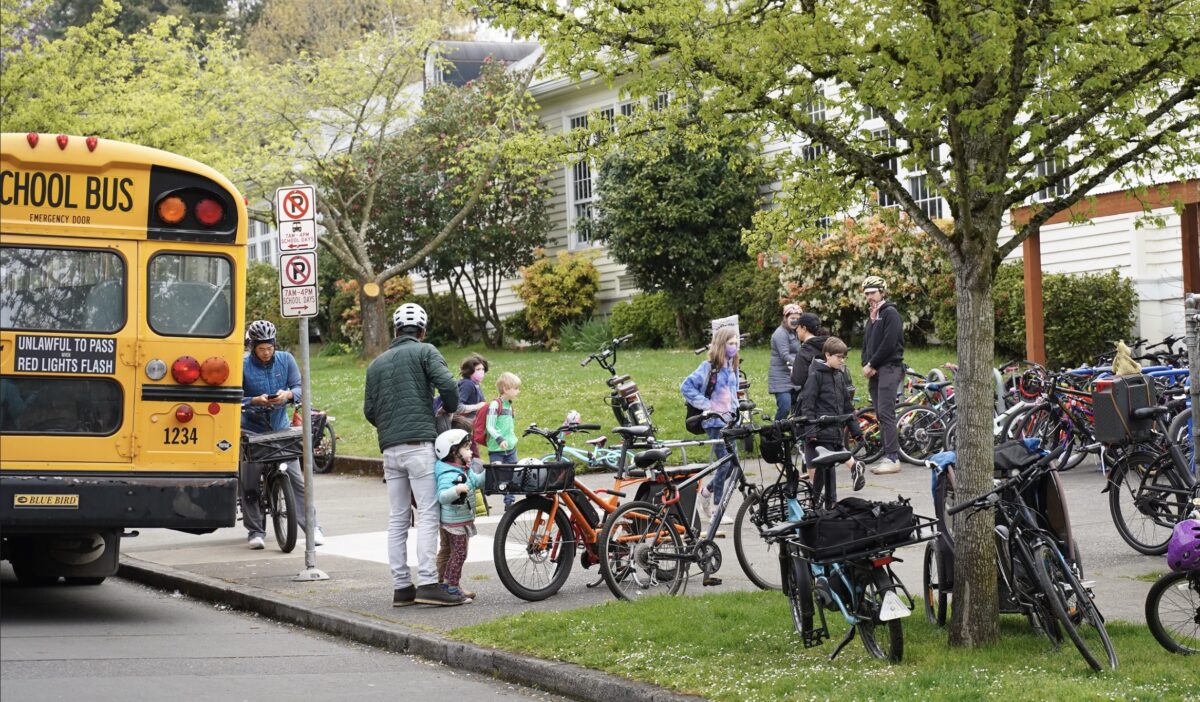
On February 20th at 3 pm, the Oregon House Committee on Education will hold a public hearing on HB 3014, a bill that could give schools more flexibility in how they spend transportation dollars. Currently, Oregon law says monies set aside for school transportation can only be spent on buses or vans.
Supporters of this bill, including Portland-based nonprofit Oregon Walks and Alameda Elementary School teacher and bike bus leader Sam Balto, feel like it’s time to expand the possibilities of these funds so they can support things like public transit passes and payments to crossing guards, as well as leaders of bike buses and walking school buses.
The introduction of this bill (which is included in our guide to the 2023 Oregon legislative session) was prompted by a school bus driver shortage that has created a school transportation crisis in Oregon for several years now. This problem resulted in Portland Public Schools cutting bus service for routes to Lincoln and Benson High Schools from areas outside of TriMet’s service area, a move that put some families in a transportation lurch.
Programs like Balto’s bike bus have demonstrated there are practical alternatives to school buses for a lot of students. But one of the things holding back the development of more bike buses across the state is the fact that most districts cannot currently can’t use their transportation funds to pay people to lead groups of kids walking and biking to school. They have to rely on volunteers instead, which isn’t sustainable for mass implementation of these transportation modes.
Here’s an excerpt from the bill text:
The rules adopted under this subsection must allow for the reimbursement of costs incurred by a school district in lieu of providing transportation, including public transit passes, payment for crossing guards or pedestrian or bicycle group leaders and payment for the promotion and coordination of alternative transportation options. In no event may a school district receive an amount under this paragraph that is greater than the amount the school district would have received under paragraph (a) of this subsection for providing transportation…
In a one-pager from bill supporters East Multnomah County Schools and Oregon Walks, they point out the bill doesn’t give districts any additional funding for new programming.
“Currently, school districts can only use State School Fund Transportation Grant dollars to cover certain types of transportation,” the brief states. “[This bill] simply gives them greater flexibility in how they use their existing dollars so they can do what it takes to get all students to school.”
Balto has long been advocating for paying bike bus and walking school bus leaders, saying it will be what truly tips the scale for these alternative transportation modes to be seen as legitimate just like the yellow school bus or the car drop-off line. HB 3014 is what could make this happen for Oregonians.
The bill currently has 11 sponsors — seven in the House and four in the Senate. All of them are Democrats. The bill will be heard in the Committee on Education. Two of the bills sponsors, Rep. Courtney Neron (D-26) and Rep. Hoa Nguyen (D-48) are members of that committee (Neron is chair).
So, if you want your kids to be able to ride a bike bus or you just want to see more TikTok videos of cute children riding bikes en masse (and who doesn’t?), pay attention to this bill. The hearing is not on the committee agenda yet, but should be posted here soon.
UPDATE, 12:50 pm: Bill sponsor Rep. Khanh Pham is hosting a bike bus day in Salem to show support for the bill at the hearing. See the flyer below for details.
Learn about all the bills on our watch list with our 2023 legislative guide.




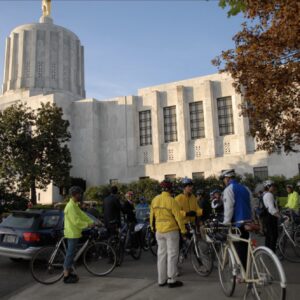
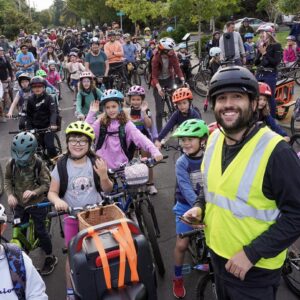
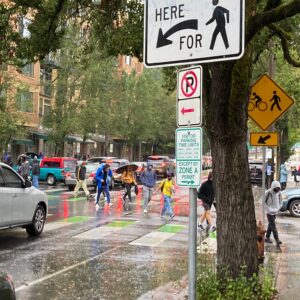
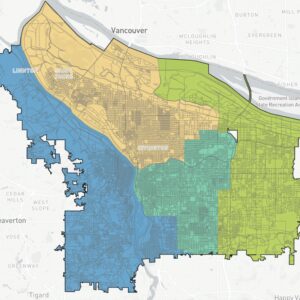
Thanks for reading.
BikePortland has served this community with independent community journalism since 2005. We rely on subscriptions from readers like you to survive. Your financial support is vital in keeping this valuable resource alive and well.
Please subscribe today to strengthen and expand our work.
I like the ideas of what this could do – paying bike bus leaders sounds awesome, maybe I’d work that into my schedule since school starts so early 🙂
I’m a little concerned that this just means taking funding away from buses, which we will continue to need, and that will erode them the same way the whole public school system keeps getting chipped away at by slowly degrading quality. This is like the damage charter schools or whatever does to public schools.
And there are the obvious cases where a bike bus or walking are too long distance to be plausible. But even where people don’t use a bike bus, if not all the students use it, I don’t see how they can really reduce the number of buses or drivers. Maybe they can have fewer buses and longer routes, but that seems non-ideal. I don’t know. Bus passes seem good.
This is another one of those (IMO fake) “labor shortage” issues that to me sounds like it’s actually just inflexible organizations that refuse to change things like pay and benefits when labor has even a modicum of other options. If they can’t find bus drivers, it’s not because there aren’t people to do it, it’s because those people found a better offer. Seems like we just need to pony up for better pay.
I am not too worried about this taking money away from buses. It is something that is likely to be used in cases where the cost per pupil of supporting the bike bus is lower than the cost of running a yellow bus per pupil. In the end it will actually probably result in there being more money left per kid for traditional buses than what we have today while also better meeting the needs of kids.
As an example of the kind of kid this could help when I was in middle school we were the last stop on the bus route, that meant it took over an hour each way to take the bus to school, but it was only 4 miles so I rode my bike, unfortunately I was eventually hit by a driver and badly hurt. Something that very well might not have happened if instead of riding alone I was riding as part of a bike bus.
Bike busses are ableist by nature and I would prefer that no public money is used to encourage heteronormative mobility constructs. Portland is uniquely capable of coming up with alternative transportation options that leverage inclusivity instead of hampering didactic methods under the banner of intersectionality.
Hi. I don’t fully understand your comment and I would like to understand it better. Are walking school buses also ableist? Or is it that children are on bikes that make it ableist? I lead the Alameda Bike Bus and we try to be very inclusive. So any information would be appreciated.
I find that we have several students with varying abilities participate in the bike bus when they would normally take a bus with one or two other students. They love the sense of community it provides that they don’t get otherwise.
How much money are we talking about in the State School Fund Transportation Grant? Is it distributed by the number of students at each school? How much would it be for the average school? What is the current cost of running buses? Is all of the money being used at all of the schools for buses now? Also education and incentives for bicycling and walking and riding buses should be promoted. That is, discourage parents driving their kids to school. Also how about banning student drivers to high school. Use the parking for other possibilities.